N.J. cranberry farmers look forward to cooler weather for ripening crops
The recent unseasonably warm days are worrying South Jersey's cranberry farmers. Their crop needs cool weather to darken to its characteristic deep red.
-
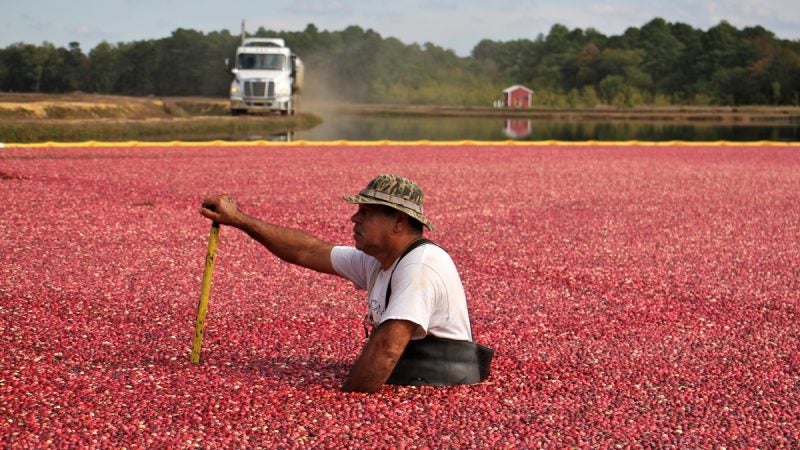
A Pine Island Cranberry worker waits for the arrival of a truck to begin the harvest. (Emma Lee/WHYY)
-
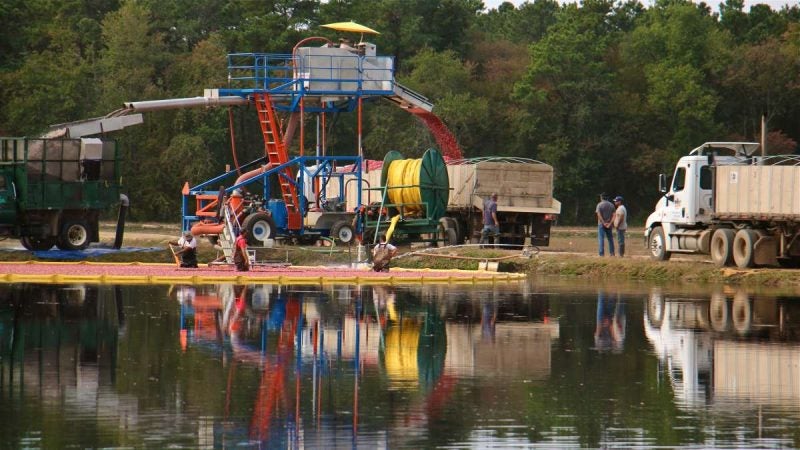
Cranberries on a flooded bog are gathered within a boom and pushed toward an uptake basket. The berries travel up through a hose to a cleaning and sorting station and are loaded onto tractor trailers. (Emma Lee/WHYY)
-

Tines on the harvester strip the vines and the dislodged cranberries float to the surface of the flooded bog. (Emma Lee/WHYY)
-
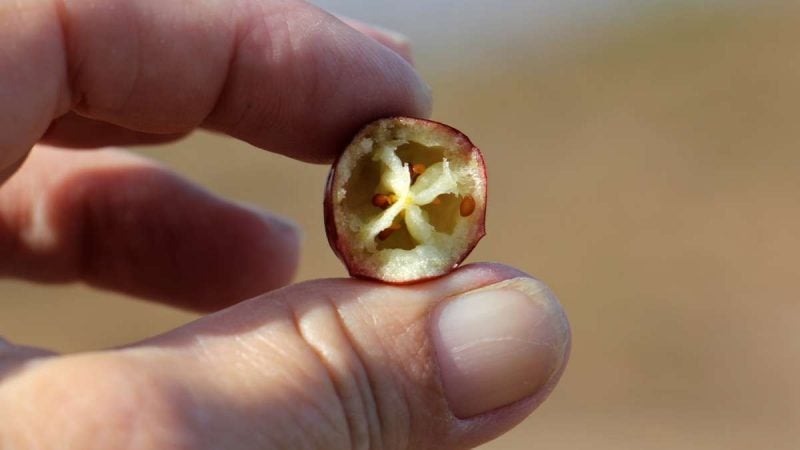
Cranberries have hollow chambers which cause them to float on water, a trait that helped the plants disperse their seeds when they grew wild on the banks of rivers. (Emma Lee/WHYY)
-

At Pine Island Cranberry in Chatsworth, New Jersey, a bog is ready for harvest. (Emma Lee/WHYY)
-
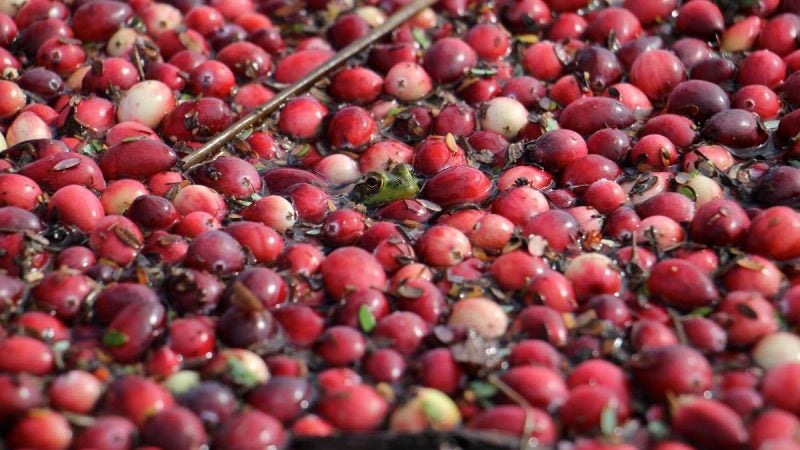
In order to get top dollar, cranberry growers want a harvest that is no more than 7 percent white. Warm weather so far this fall has prevented some of the crop from reaching the deep red that buyers want. (Emma Lee/WHYY)
-

Workers push berries toward an uptake basket at Pine Island Cranberry in Chatsworth, New Jersey. (Emma Lee/WHYY)
-

A Pine Island Cranberry worker uses a paddle to push cranberries toward the uptake basket in the flooded bog. (Emma Lee/WHYY)
-

Within the ever shrinking circle of the boom, workers push cranberries toward the uptake basket. (Emma Lee/WHYY)
-

Cranberries are rinsed as they bounce down the chute to a waiting truck. (Emma Lee/WHYY)
-
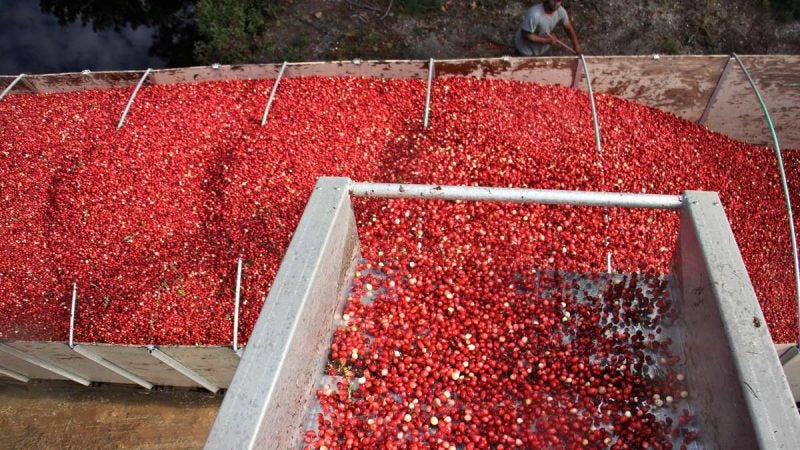
Harvested cranberries are loaded directly into a truck. (Emma Lee/WHYY)
-
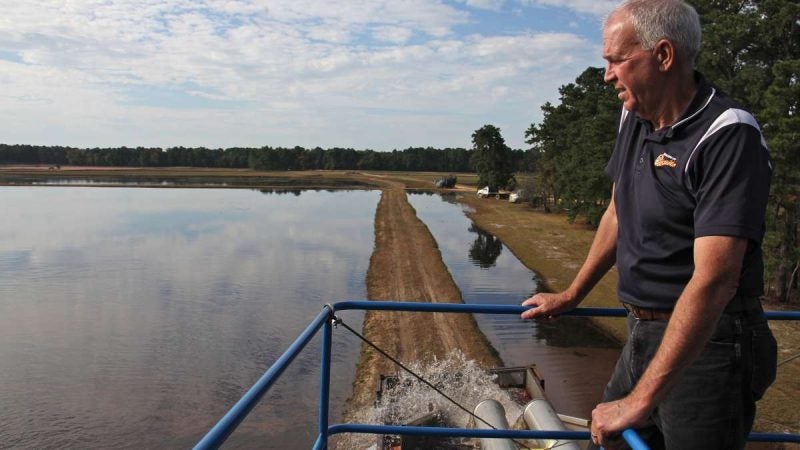
Bill Haines, a fourth generation cranberry farmer, looks over his bogs from the top of an uploading station, where the harvest is rinsed and sorted and loaded onto trailers. (Emma Lee/WHYY
-

The Haines family has been farming cranberries in Chatsworth since 1890, beginning with Martin L. Haines (right). (Emma Lee/WHYY)
Not everyone in the Delaware Valley is enjoying the summer-like temperatures of late. New Jersey’s cranberry farmers are hoping the weather cools off soon for the benefit of their crop.
Bill Haines is a fourth-generation cranberry farmer. His bogs stretch over 1,400 acres of the Pine Barrens in South Jersey. And he would like autumn to hurry up.
“From now until the first of November, a perfect day would be a high of 68 and a low in the evening of about 45,” said Haines in a bout of wishful thinking.
Cranberries start out pale green, then turn white and finally the characteristic deep red. The cool weather darkens the berries, making them more valuable to growers.
“We get incented for color and firmness of the fruit,” Haines said. “We can actually get deducted if the percentage of white fruit is too high.”
Last year, New Jersey harvested about $28 million in cranberries. Once an industry of many small farms, consolidation has left the business to a handful of growers.
Cranberry vines are perennials, bearing fruit every year.
“We know where my great-grandfather first planted cranberries, and I think that some of those original vines are there,”Haines said. “And he started here in 1890.”
Back then, berries were mostly dry-harvested with special scoops bearing teeth that combed through vines. These days, Pine Island wet-harvests the berries, flooding each bog, then lassoing the berries onto a chute. After that, they’re sent to an Ocean Spray facility for processing.
“All of our cranberries go either for cranberry juice or Craisins — and there are no artificial colors, so you need the good dark cranberries to make those products,” said Haines.
So far, he said, the unseasonably warm weather hasn’t drastically affected the crop.
And Haines said that, recently, he’s been more focused on the weather in Puerto Rico amid the aftermath of Hurricane Maria. Because of the damage, some of his seasonal workers won’t make it to the mainland this year.
“It’s really tough. Most of my [seasonal] workers are from the island, and they’ve had difficulty contacting their families because cell service was knocked out,” he said. “Later on this season, we may be a little short staffed, because people that we know have lost their roofs. So it’s perfectly understandable that they’re not going to come over.”
Editor’s note: This story was updated to reflect that deer, in addition to tundra swans, love cranberries. An earlier version of the story incorrectly stated that tundra swans were the cranberry’s only animal predator. We apologize for the discrepancy.
WHYY is your source for fact-based, in-depth journalism and information. As a nonprofit organization, we rely on financial support from readers like you. Please give today.




